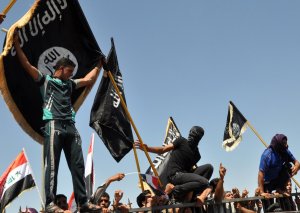
While the international community and world leaders have looked down on the IS as a political-religious aberration, a terror group gone global on the wave of anti-western sentiment which animates the MENA region – Middle East and North Africa – Muslims, Shia and Sunni compounded have understood IS as the materialization of a millennium old prophecy – the coming of Imam Madhi and the end of days.
If Muslims are well known for their disagreements and divergent interpretations of the Quran there is one thing upon which they all agree, regardless of their origins or even sects, it is that before this world comes to an end a great evil will be unleash upon the Muslim Ummah (community) and that a leader from the Prophet Mohammed’s house (PBUH) (a descendant of his) will rise against tyranny and oppression to lead the people out of darkness – Imam Mahdi, and restore order.
This idea that a saviour will arise at a time when darkness has invaded all is actually a recurrent theme in both Christianity and Judaism. Whether in the Old or New Testament and in this case the Quran, prophets have always told of a man from God and of God who will claim leadership over all and show humanity a way to salvation.
When it comes to Islam, a great deal of prophetic details have accompanied such news, to such an extent that even non-Muslims will find difficult to ignore the writings on the wall … so do speak.
If no one disagrees with the inherent nefarious nature of the Islamic State, it is crucial to understand this movement within the perimeters of Islamic tradition and mysticism if one is truly to grasp the nature of this war which is raging in the Middle East. While there are many layers to this conflict – political, geo-strategic, ideological – for Muslims it is mostly about the coming to pass of a warning.
In Kitab Al Fitan – a compilation of hadiths (Islamic tradition) relating to the end of times put together by prominent scholar Nuyam bin Hammad in 229 AH –Imam Ali bin Abu Talib (AS) – Prophet Mohammed’s son-in-law, cousin and caliph (PBUH) reportedly said, “If you see the black flags, then hold your ground and do not move your hands or your feet. A people will come forth who are weak and have no capability, their hearts are like blocks of iron. They are the people of the State (literally the people of Al Dawla), they do not keep a promise or a treaty. They call to the truth but they are not its people. Their names are (nicknames like Abu Mohammed) and their last names (are the names of town and cities, like Al Halabi) and their hair is loose like women’s hair. (Leave them) until they fight among themselves, then Allah will bring the truth from whoever He wills.”
Moreover, Imam Ali (AS) foretold this political and social confusion which would befall the world, he warned that at some point Muslims may cross swords with Muslims while in alliance with non-Muslims. Looking at events currently unfolding in the Middle East such warnings have found a deep echo within the Muslim community and religious leaders, among whom most prominently Sayyed Hassan Nasrallah and Ayatollah Ali Khamenei. Both have mapped their decisions within such religious parameters.
While Sunni Muslims remain deeply divided, looking to assign blames for the atrocities committed by IS in the name of Islam, the Shia have looked to the hadiths and recognized IS for the great evil which was once foretold and subsequently chose to unite in order to oppose it.
If this might seem irrelevant to many, it is exactly this unification of faith and the belief that Islam’s prophecies are being fulfilled which drives the deeper narrative of this conflict and will ultimately take centre-stage.
Whether or not one chooses to adhere to Muslims’ faith and interpretations of their Scriptures is actually irrelevant; what really matters is that Muslims do and that such belief will shape future events, alliances and political decisions.
When one already knows how a book ends everything in between takes on a different perspective. Without understanding the underlining dynamics of this conflict one stands no chance of regaining control over chaos, let alone defeat IS’s wave of terror.
Catherine Shakdam is the Associate Director of the Beirut Center for Middle Eastern Studies and a political analyst specializing in radical movements, exclusively for the online magazine “New Eastern Outlook”.
